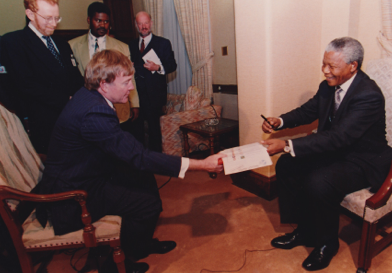People
The day Nelson Mandela gave Reuters a world scoop
Friday 6 December 2013
 Nelson Mandela, who died yesterday aged 95, once gave Reuters a handsome world scoop.
Nelson Mandela, who died yesterday aged 95, once gave Reuters a handsome world scoop.
The new president of a democratic South Africa agreed to be interviewed by the then fledgling joint Reuters TV and text service within days of being sworn in, in May 1994.
Reuters South Africa was at the forefront of the company's new multi-media operation, formed by the union of Reuters text and pictures and former Visnews. The bureau had mounted formidable coverage of the end of apartheid and the beginning of majority rule during Mandela's four-year march from prison to the presidency.
The team had been at full stretch covering the political negotiations and the fierce township wars between Mandela's African National Congress and the Inkatha Freedom Party of Zulu Chief Mangosuthu Buthelezi - as well as a spluttering last-ditch campaign by extreme right Afrikaaners.
Our coverage of amazing voting day, when millions of black South Africans enthusiastically cast ballots for the first time, had dominated the play.
We applied immediately for a major interview with the new president. Helped by the excellent contacts built up over years by reporters Rich Mkhondo and Brendan Boyle and photographer Juda Ngwenya - and Reuters reputation for integrity in South Africa and beyond - we were quickly granted a date.
It was Mandela's first TV interview for an international news organisation - and happily, it coincided with a bureau visit by editor-in-chief Mark Wood and Africa editor Graham Stewart.
The Reuters team gathered at the president's office in stately Union Building in Pretoria, built by Sir Herbert Baker in 1908. Mark presented the great man with a leather-bound history of Reuters.
The two-camera interview, conducted by me and filmed by Mark Chisholm and Dinky Mkhize, went well. Mandela was relaxed and expansive, talking about his "long walk to freedom" and his plans for the new rainbow nation.
It ended on a lighthearted note when I asked Mandela to sign a copy of the historic ballot paper for South Africa's first democratic election. He did so with a broad grin and a flourish, pictured - adding a bold cross in the box for the ANC.
It neatly rounded off a circle that had begun for me in 1977 when I began my first short assignment to South Africa, en route to Rhodesia and another end of era.
I was in a small group of international and South African journalists taken on a unique visit to Robben Island, where Mandela was incarcerated. We were not allowed to speak to any prisoners but we saw Mandela from a distance and trooped through his tiny, bare cell. It would be 13 years before any journalist saw him again.
A postscript: Out of the blue, I learned a few weeks ago that Reuters had played a small but critical role in the peace negotiations that brought about majority rule.
We had hosted a table at the annual Foreign Correspondents' Association dinner and I had invited two of my best contacts, Joe Slovo of the ANC and Roelf Meyer of the ruling National Party, who were key negotiators for their parties. One sat on my right, the other on my left.
They seemed to get on well together over the rubber chicken but I discovered they had never previously met. After we had eaten, I got up from the table and left them to it so they could talk some more without a hack hanging over.
Then, about a month or two ago, I was contacted by an Oxford academic who is writing a book about the negotiations. She told me that Meyer vividly remembered the event. He said it was key to establishing a top-level relationship that helped get the peace talks off the ground.
And I thought we were only reporting history. ■
- « Previous
- Next »
- 408 of 577